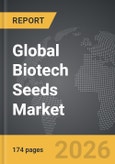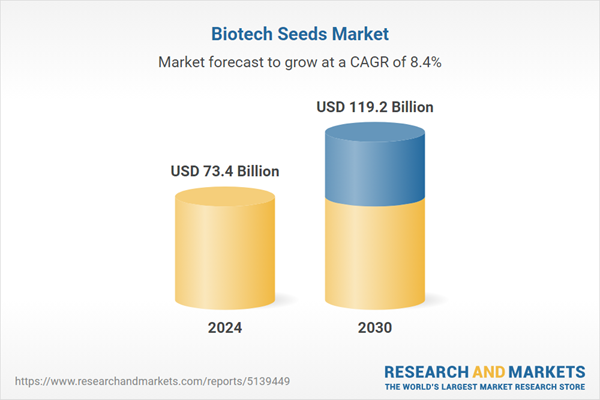Global Biotech Seeds Market - Key Trends and Drivers Summarized
What Are Biotech Seeds and Why Are They So Critical to Modern Agriculture?
Biotech seeds, also known as genetically modified (GM) seeds, are seeds that have been scientifically engineered to exhibit specific traits that enhance their growth, resilience, and yield. Unlike traditional seeds, biotech seeds are developed through the manipulation of an organism's genetic material, allowing them to possess qualities such as resistance to pests, tolerance to herbicides, and adaptability to various environmental conditions. These seeds have become a cornerstone of modern agriculture, particularly in addressing the global challenges of food security, climate change, and sustainability. The use of biotech seeds has enabled farmers to significantly increase crop productivity, reduce the reliance on chemical pesticides and fertilizers, and cultivate crops in regions previously deemed unsuitable for agriculture. As a result, biotech seeds have become essential to the global food supply chain, ensuring that a growing population can be adequately fed while minimizing the ecological footprint of farming practices.How Has the Development of Biotech Seeds Evolved Over Time?
The evolution of biotech seeds has been marked by significant scientific breakthroughs and regulatory advancements. The journey began in the 1990s when the first genetically modified crops, such as Bt cotton and Roundup Ready soybeans, were introduced to the market. These early biotech seeds were engineered to express traits like pest resistance and herbicide tolerance, which offered substantial benefits to farmers in terms of yield protection and weed management. Over the years, the technology has advanced, allowing for the development of seeds with more complex traits, such as drought tolerance and enhanced nutritional content. The research and development process for biotech seeds is highly rigorous, involving extensive field trials and regulatory approvals to ensure safety for human consumption and environmental impact. As technology continues to advance, newer generations of biotech seeds are being developed with even more sophisticated traits, such as resistance to multiple pests, enhanced photosynthetic efficiency, and the ability to thrive in extreme environmental conditions. These innovations are crucial in addressing the challenges posed by climate change and ensuring the resilience of global food systems.What Are the Emerging Trends and Innovations in the Biotech Seeds Industry?
The biotech seeds industry is witnessing several emerging trends and innovations that are shaping its future. One of the most significant trends is the integration of precision agriculture with biotech seeds, where data-driven technologies such as drones, sensors, and artificial intelligence are used to optimize seed planting, growth monitoring, and yield prediction. This approach not only maximizes the benefits of biotech seeds but also minimizes resource use, thereby promoting sustainability. Another trend is the increasing focus on developing seeds that cater to the growing demand for organic and non-GMO products, which has led to the rise of hybrid seeds that combine traditional breeding techniques with modern genetic engineering. Additionally, there is a growing emphasis on developing biotech seeds that address specific regional challenges, such as seeds that are tailored for arid climates or those that can withstand high salinity levels in soil. These innovations are driven by the need to adapt to changing agricultural conditions and consumer preferences, ensuring that biotech seeds remain relevant and effective in a rapidly evolving market.What Are the Key Drivers Behind the Growth in the Biotech Seeds Market?
The growth in the biotech seeds market is driven by several factors that are reshaping the agricultural landscape. One of the primary drivers is the increasing global population, which necessitates higher agricultural productivity to meet the rising demand for food. Biotech seeds, with their ability to produce higher yields and resist environmental stresses, are crucial in meeting this demand. Another significant factor is the growing incidence of extreme weather conditions due to climate change, which has led to a greater reliance on seeds that can withstand droughts, floods, and temperature extremes. Additionally, the shift towards sustainable farming practices is fueling the adoption of biotech seeds, as they reduce the need for chemical inputs and promote environmentally friendly agriculture. The expanding global trade of agricultural products has also contributed to the growth of the biotech seeds market, as farmers seek seeds that can produce crops with consistent quality and yield in diverse climatic conditions. Furthermore, advancements in biotechnology and the increasing acceptance of GM crops in various countries are accelerating market growth, as regulatory barriers diminish and consumer confidence in biotech products grows. These drivers collectively underscore the pivotal role that biotech seeds play in the future of global agriculture.Report Scope
The report analyzes the Biotech Seeds market, presented in terms of market value (USD). The analysis covers the key segments and geographic regions outlined below.- Segments: Crop Type (Cotton, Corn, Soybean, Other Crop Types).
- Geographic Regions/Countries: World; United States; Canada; Japan; China; Europe (France; Germany; Italy; United Kingdom; Spain; Russia; and Rest of Europe); Asia-Pacific (Australia; India; South Korea; and Rest of Asia-Pacific); Latin America (Argentina; Brazil; Mexico; and Rest of Latin America); Middle East (Iran; Israel; Saudi Arabia; United Arab Emirates; and Rest of Middle East); and Africa.
Key Insights:
- Market Growth: Understand the significant growth trajectory of the Cotton Seeds segment, which is expected to reach US$48.6 Billion by 2030 with a CAGR of 8%. The Corn Seeds segment is also set to grow at 8.5% CAGR over the analysis period.
- Regional Analysis: Gain insights into the U.S. market, valued at $19 Billion in 2024, and China, forecasted to grow at an impressive 11.3% CAGR to reach $26.4 Billion by 2030. Discover growth trends in other key regions, including Japan, Canada, Germany, and the Asia-Pacific.
Why You Should Buy This Report:
- Detailed Market Analysis: Access a thorough analysis of the Global Biotech Seeds Market, covering all major geographic regions and market segments.
- Competitive Insights: Get an overview of the competitive landscape, including the market presence of major players across different geographies.
- Future Trends and Drivers: Understand the key trends and drivers shaping the future of the Global Biotech Seeds Market.
- Actionable Insights: Benefit from actionable insights that can help you identify new revenue opportunities and make strategic business decisions.
Key Questions Answered:
- How is the Global Biotech Seeds Market expected to evolve by 2030?
- What are the main drivers and restraints affecting the market?
- Which market segments will grow the most over the forecast period?
- How will market shares for different regions and segments change by 2030?
- Who are the leading players in the market, and what are their prospects?
Report Features:
- Comprehensive Market Data: Independent analysis of annual sales and market forecasts in US$ Million from 2024 to 2030.
- In-Depth Regional Analysis: Detailed insights into key markets, including the U.S., China, Japan, Canada, Europe, Asia-Pacific, Latin America, Middle East, and Africa.
- Company Profiles: Coverage of players such as Bayer AG - Crop Science Division, Dow, Inc., DuPont de Nemours, Inc., KWS SAAT SE, Limagrain Europe and more.
- Complimentary Updates: Receive free report updates for one year to keep you informed of the latest market developments.
Some of the 44 companies featured in this Biotech Seeds market report include:
- Bayer AG - Crop Science Division
- Dow, Inc.
- DuPont de Nemours, Inc.
- KWS SAAT SE
- Limagrain Europe
- Monsanto India Limited
- Syngenta AG
This edition integrates the latest global trade and economic shifts into comprehensive market analysis. Key updates include:
- Tariff and Trade Impact: Insights into global tariff negotiations across 180+ countries, with analysis of supply chain turbulence, sourcing disruptions, and geographic realignment. Special focus on 2025 as a pivotal year for trade tensions, including updated perspectives on the Trump-era tariffs.
- Adjusted Forecasts and Analytics: Revised global and regional market forecasts through 2030, incorporating tariff effects, economic uncertainty, and structural changes in globalization. Includes historical analysis from 2015 to 2023.
- Strategic Market Dynamics: Evaluation of revised market prospects, regional outlooks, and key economic indicators such as population and urbanization trends.
- Innovation & Technology Trends: Latest developments in product and process innovation, emerging technologies, and key industry drivers shaping the competitive landscape.
- Competitive Intelligence: Updated global market share estimates for 2025, competitive positioning of major players (Strong/Active/Niche/Trivial), and refined focus on leading global brands and core players.
- Expert Insight & Commentary: Strategic analysis from economists, trade experts, and domain specialists to contextualize market shifts and identify emerging opportunities.
Table of Contents
Companies Mentioned (Partial List)
A selection of companies mentioned in this report includes, but is not limited to:
- Bayer AG - Crop Science Division
- Dow, Inc.
- DuPont de Nemours, Inc.
- KWS SAAT SE
- Limagrain Europe
- Monsanto India Limited
- Syngenta AG
Table Information
| Report Attribute | Details |
|---|---|
| No. of Pages | 174 |
| Published | February 2026 |
| Forecast Period | 2024 - 2030 |
| Estimated Market Value ( USD | $ 73.4 Billion |
| Forecasted Market Value ( USD | $ 119.2 Billion |
| Compound Annual Growth Rate | 8.4% |
| Regions Covered | Global |









